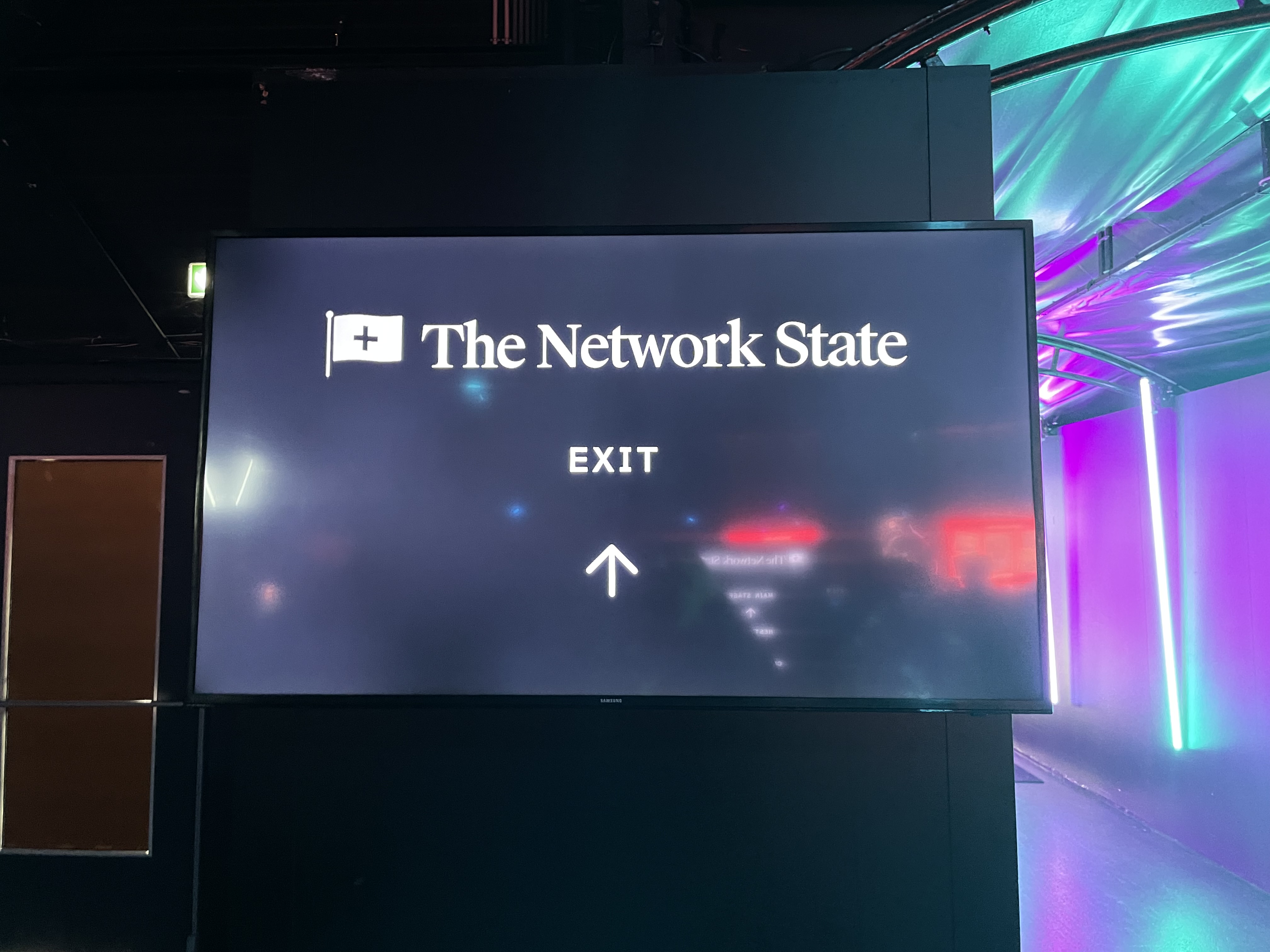State of the Network State
It’s a bright wet day in Amsterdam, and the grass is preternaturally green. I meander through what looks like would result if a post-growth mixed-use Euro-paradise…

…and Breezewood, Pennsylvania…

…had a baby.
A liminal mall-parking-lot suburbia except it’s lined with wide bike paths, pedestrian bridges, and distant windmills…

leads me through what looks and smells like a landfill…
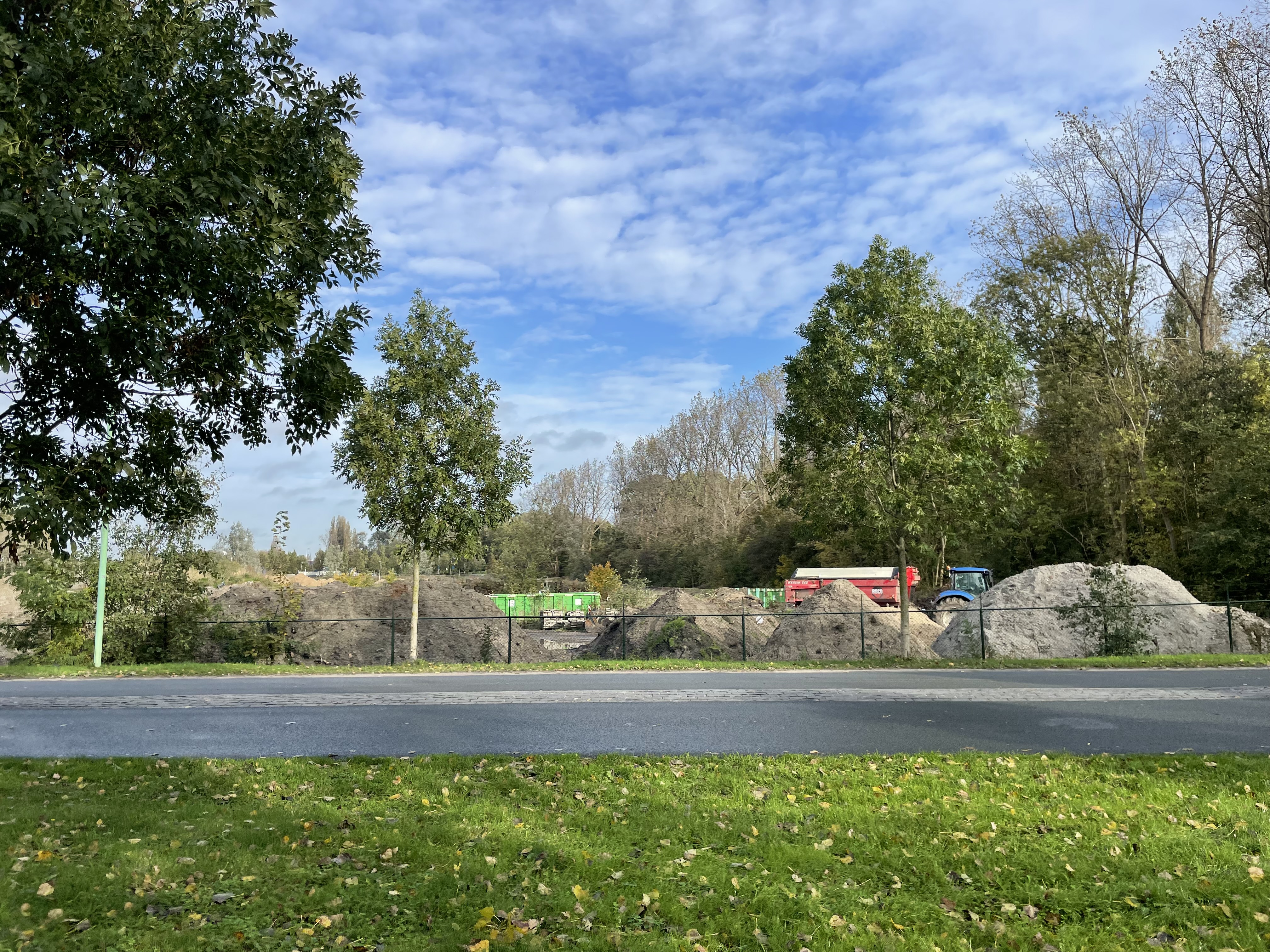
…past something called the Museum of Humanity, around the corner, and through a check-in line shared with the colocated Solana Breakpoint, into a dim cave of white-on-black, sans-serif aesthetics and movie-trailer music. This is the Network State conference, and we’re here to build the parallel establishment.
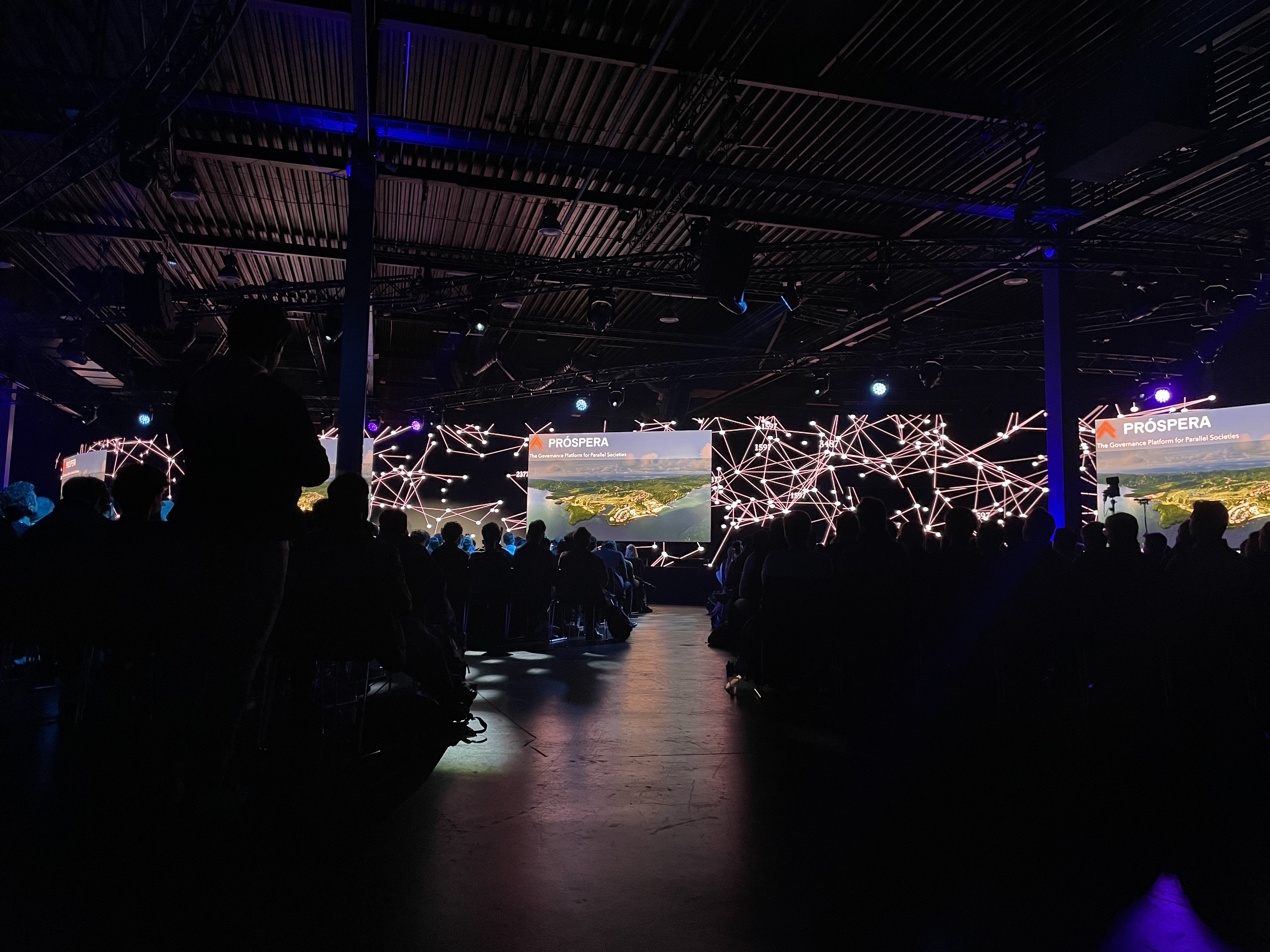
As far as I can tell, the conference was thrown together over a few weeks; at least, it was announced October 16 and took place October 30. Many of the big names appeared only in the form of short recorded videos. The full list of speakers wasn’t released until the day before. But even so, the hiccups were minor (spotty wifi, looming ideological battle with the newly-socialist-led Honduran government over Special Economic Zone legal disputes). And the vibes were major (an animated constellation of somewhat large numbers accompanied by the same five seconds of IMAX-trailer music heralding each speaker).
It’s been a year and change since conference organizer Balaji Srinivasan published the event’s namesake book last Fourth of July. So how’s the network state been shaping up since?
Theme 1: Incrementalist vs All-At-Once
The whole thesis of the conference runs counter to the traditional connotation of incrementalism – the strategy of making gradual changes to an existing system. Instead, everyone is building something new from scratch. But there’s another sense in which incrementalism comes into play: should a project do extensive scheming, bargaining, fundraising, and movement-building before it launches, or should it start as a tiny MVP that snowballs bit by bit?
Says Andrew Rose of Fractal: “Community organizers have to incrementally slouch toward utopia like anyone else.” Andrew and his co-organizer/wife Priya Rose talk about how Fractal, a collective of “friendly, ambitious nerds” who all moved into the same Brooklyn apartment building, started with no capital, governance, land, or DAOs; their cold-start process was 1. plant the flag; 2. host weekly; 3. offer short-term stays. A similar effort called The Neighborhood (instead of a single building, a single square mile) is underway in San Francisco, led by Jason Benn. Brooke Bowman’s Vibecamp started with an offhand tweet that became a festival that became an annual festival with a tail of regional-burn-like offshoots. Participants, many of whom had been informal members of an emergent Twitter scene, turned out to have lots of pent-up eagerness to build community in real life. Alex “Grin” Grintsvayg (also, incidentally, a Vibecamp organizer!) speaks on behalf of Cabin, a DAO-citizenship-gated network of 23 coliving houses. They started with one – Neighborhood Zero outside Austin, Texas – and use supper clubs as a growth engine, although they’re intentionally avoiding growing faster than the culture can keep up.

Brooke Bowman of Vibecamp
Fractal, the Neighborhood, the Vibecamp extended universe, and Cabin are all physically decentralized, which makes them more robust – if one location or event crumbles into the sea, the others can continue.
One other model for incremental iteration is represented by Ryan Rzepecki’s company, Spectra. They’re building VR to prototype city designs. Here, the incrementality comes from starting virtual, where some of the concept testing can be done cheaply before actually breaking ground (or that’s the idea, at least – the extent of their current physical infrastructure is a pair of buildings in Puerto Rico, but theoretically, anyone can build infrastructure designed on their platform).
The poster child for the all-at-once end of the spectrum is Praxis, pitched by its cofounder Dryden Brown (“Investor, Surfer, American”). They’ve got an offer from the government of an unnamed Mediterrean country, apparently, but they’re tight-lipped and still shopping around. Projected timeline for the first mover-inners is 2026. “You basically need a billion dollars,” says Dryden. Contrast with, e.g., Vibecamp and Fractal, which were both nothing but ideas one or two years ago.
Not too many speakers explicitly make the case for the start-big approach, although quite a few projects seem to use it in practice. I suspect it depends on how much a given project requires serious legal overhaul. On some level, like, you either have a treaty with the Honduran government or you don’t. Lots of speakers at this conference reference the quartet of Dubai, Hong Kong, Singapore, and Shenzhen, the four success stories of cities that got rich fast after being designated Special Economic Zones in one form or another, which meant they had really low taxes or minimal corporate regulation or Western-style common law or all three. Those didn’t arise incrementally – their countries enacted development plans top-down and legislatively.
Flannery Associates, the group that bought up tens of thousands of acres an hour east of the Bay Area presumably to build a San Francisco alternative, isn’t represented at the conference; with demand and capital already in place, they seem to have been going for stealth. In this sort of case, that’s probably the right play: they’ve already got more money than they know what to do with, and everyone in the Bay Area complains constantly about how much they wish there were a different, better Bay Area. The main hurdle is getting around the dumpster fire that is California’s land use policies. I’m pretty sure if you start whispering in California about how you think it might be cool to buy up a few adjacent plots of land someday, a hooded figure comes up behind you and hustles you into a windowless room where you have to write Environmental Impact Reports in your own blood till you repent.
So while coordination problems are apparently surprisingly tractable if you establish small Schelling points and grow them over time, sovereignty problems probably require a different approach. There’s certainly an overlap, though, in that it’s useful to have a large existing group of people or businesses to point to when you make the case to, say, a prospective host country. Although not as grassrootsy as Cabin’s supper clubs, Praxis does hold membership salons to recruit their goal of 10,000 initial residents. Culdesac, a real estate company that’s just opened a car-free neighborhood of a thousand people in Tempe, Arizona, seems like a nice happy medium.
Theme 2: Nomadic vs Rooted
Even at the Network State Conference, there’s considerable disagreement over whether the new state should actually be networked.
Model A: nomads travel from location to location; the locations all share some operational infrastructure in common. Cabin is like this. Kift is the vanlife version, though they aren’t represented here. Zach Milburn pitches Nomad, which is sort of like Cabin but if the aesthetics were a r/malelivingspace twist on AirSpace; the idea is that the locations are supposed to share a common design so you can seamlessly leap from one to the next, Starbucks-style.
Model B: people live wherever they want, but some infrastructure traditionally done by their existing government is now done by someone else. Sondre Rasch pitches Plumia, a social safety net for nomads – he talks about healthcare, disability benefits, parental leave, retirement, unemployment. (I’m not sure how the adverse-selection economics work out here, but both network and physically-centered new states will have to contend with the issue of social services somehow.)
Model C: lots of people move to a single new place together. Zuzalu did this temporarily as a two-month pop-up; groups attempting it permanently or semipermanently include small-scale experiments like Fractal and The Neighborhood as well as larger, jurisdictionally independent ones like Próspera, various ill-fated attempts at seasteading, and charter cities generally.
Theme 3: Localist Values vs Cultural Values vs Governance
Within Model 3, it feels like there’s a spectrum of engagement with physical place. On the far end is probably hippie communes or kibbutzes, which aren’t represented here but have a similar separatist, building-from-scratch mindset except they seem really integrated with the land they end up on; they always seem to end up doing permaculture. They’re creating societies that reflect their values in both who they want to live with and what kind of land they want to live on.
Then there are the New Urbanists. They don’t really care about bringing one particular culture together; they’re just frustrated with entrenched land use policies and want to start fresh. Spectra, Culdesac, Cover (see the Notes section).
Next, there are the groups of people who want to live together for cultural reasons without having particularly naturalist or back-to-the-land sensibilities, so they usually end up in urban hubs; that’s Fractal and The Neighborhood. They’re full of transplants to those cities who don’t plan on living in those places forever, but they do want more persistent community than the average tech-scene transplant in those cities, so they do neighborhood cleanups and build third spaces and things like that.
Lastly, there are the Special Economic Zones. Próspera, Praxis, all the future Dubai/Hong Kong/Singapore/Shenzhens that the Charter Cities Institute and Pronomos want to fund. Beyond basic considerations of geopolitical stability and weather, a Special Economic Zone is basically just optimizing for which government will give it the best deal. If they end up with nice sidewalks and schools, great, but their main job is to get rich. And then maybe to invent stuff: Mark Lutter suggests that developing countries should focus charter city efforts on economic growth, while developed countries should focus them on technological innovation. He also thinks charter cities have value as sandboxes for regulatory innovation – “a rule for changing rules.” In this view, the point isn’t to make one particular charter city a nice place to live, but for these cities to yield external benefits in the forms of knowledge and industry.
(There are also some people who think new states should be centered around values and culture, but whose values are indistinguishable from “develop Special Economic Zones.” They’re nominally right-libertarians, but they tend to be more center-right in practice, viewing freedom as a means to the end of techno-accelerationist growth.)
It doesn’t feel quite right to decouple laws from culture from physical place. In this respect, the… placier?… end of the spectrum is getting something right. But I also notice some distinction between solving-the-meaning-crisis idealists and escaped-the-regime types, something about having skin in a more concrete game. And this seems to point toward the value of ambitious political reorganization on a level independent of location.
Theme 4: Golf Courses vs Average Joes
From time to time I felt like I’d walked onto the set of The White Lotus.
Yayem, pitched by founder Lindsey Elkin, is “a new kind of members’ club for a new kind of nomad.” The new kind of nomad is like the old kind of nomad, except not broke: they aren’t hostel-hopping on a small budget, but rather “building companies, scaling businesses.” Yayem boasts a diverse global community of “top tech execs and telenovela actresses.” “The world really is your oyster today,” Lindsey says, “and with Yayem, you have the tools to shuck it.”
Businessman Shervin Pishevar talks about how he invested in a Bahamian island in an attempt to turn it into “basically the Hampdens of Miami and Palm Springs.” Norman’s Cay has an airport (seized from Pablo Escobar) with its own customs and a large runway, so private jets can land there; there’s also a marina where “you can actually bring yachts of any size”. He counts Balaji and Elon Musk as “dear friends”; the island’s buildings are designed by “famous architects.” He held his birthday party there.
Praxis membership comes with a metal “Steel Visa,” which is presumably supposed to accidentally clatter out of your wallet on a date. Erick Brimen of Próspera touts the island’s Montessori school and the driving range as selling points. Luis Cuende’s Baseflow helps you get a second passport by investing $100k. What if the network state gets eaten by the warp-speed development -> material wealth outstrips cultural adaptation -> cursed tuhao vibes pipeline? Does anyone really like Dubai?
There have been some pretty good talks here, but the only one that causes me to think, verbatim, “based” is Codie Sanchez’s. Codie is a YouTuber who teaches people the financial strategy of buying boring local businesses like car washes and laundromats. Her talk shills her business a little, but mostly it’s a stump speech about building parallel institutions for normal, non-internet-values, possibly even working-class people.

Codie Sanchez of Contrarian Thinking
“We need dirty fingernails and calloused hands just as much as we need big huge brains,” she says. A one-sentence slide reads, “I have no mathematical theorems or theories of the future.” It’s followed by a slide that says, “Just one thought.. what if those who are most open to a new decentralized, open sourced world… are the very people you are leaving behind?”
Obviously you don’t become a big-name YouTuber without being an entertaining speaker, but about halfway through I realize I’m also watching a really skilled rhetorician in action. Relative to the values of this crowd, her message is actually fairly combative. The argumentative version of her thesis would be, look, quit being so galaxy brained, don’t act like you’re God’s chosen ones who are too precious to live among the sheeple. The Slate article writes itself.
But from the start Codie signals explicitly that she’s on board with the idea of parallel institutions, and implicitly that she’s not left-coded. She tells us about how she used to work on Wall Street but got frustrated that it was… is she going to say greedy? No, she says overregulated. Then she brings up a Thomas Sowell quote, citing him as one of her “favorite economists” – and before you know it she’s arguing against the quote, but no big deal, she’s not arguing against you personally, we’re all Thomas Sowell fans here. She does a whole bit about showing Beff Jezos’s Twitter bio to her boomer parents and asking them how many words they recognize. But it’s all in good fun: “And I like the guy! Well, hopefully he’s not here and is like ‘forget that woman!’”

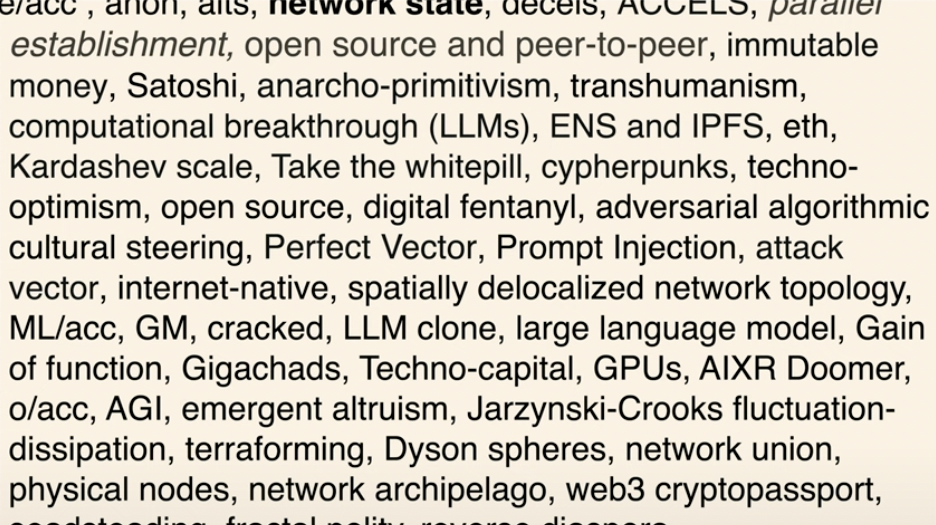
once the miladys get their hands on this it's all over
These signals of good faith let her get away with a lot. She basically says, hey, stop calling people decels, remember the deplorables? She pulls up a Balaji quote: “[I]n the West, you can no longer assume the power will be on, the roads will be open, the fires will be put out, or the crime will be put down.” And then she uses it to speak for the electricians and plumbers. “Who’s going to fix it? Are the people that are going to fix these things in this room? … They’re not on Twitter. They’re not here.” Who-isn’t-in-this-room is a classic talking point of left-wing identity politics, and yet she’s deploying it pretty effectively to Balajiites!
What’s also interesting is that “let’s stick up for the little guy on Main Street” is basically the thrust of every single speech at a normal political convention. But here, it instead sounds refreshing and unexpected. In the context of a quickly growing anti-establishment movement, it’s the ever-important warning: if you’re going to overthrow the elites because you dislike elitism, make sure you don’t just become the new elites.
Theme 5: Should The Residents Live Forever Or Not
I get that there’s got to be some correlation between people interested in weird ambitious new governing institutions and weird ambitious new designs for the human life cycle. But even given that, I’m surprised at just how often I’ll be at a not-at-all-biotech-related event that caters to some flavor of techno-futurist, and people will casually drop the Shangri-La Clause: “…oh and also we’ll live there forever immortally.”
The Network State Conference is no exception. Niklas Anzinger, who runs a Próspera-based startup city venture capital firm called Infinita, devotes his talk to explaining how Próspera’s regulatory system lets companies innovate without all the hindrance of the FDA bureaucracy, so that they can invent gene therapy to make people age slower. (He shows a slide with the requisite photo of Bryan Johnson.) They’ve built something called the Pristine Regenerative Medicine Hub. Patri Friedman, whose talk otherwise has nothing to do with biotech, mentions as an aside at the very end that he is personally flying to Próspera next week to get his genes edited. Laurence Ion, wearing an Apple Watch, an Oura ring, and a large bandage all on the same hand, gives a half-rousing, half-menacing talk (“Join or die. Thank you”) about Vitalia, a Zuzalu-style popup city except it’s in Próspera and all about longevity. (And also, Brooke Bowman of Vibecamp is involved in its organizing – there’s something about longevity that seems to generate an absurd number of crossover episodes.)

Laurence Ion of Vitalia
What’s going on here? Like, are people working on anti-aging treatments because existing health sub-industries and bureaucratic apparata have choked out all the other product spaces, leaving longevity as the only place for innovation? I don’t think so; the longevity people seem pretty ideologically serious about actually wanting to cure aging.
Or is it the opposite – longevity research is more tightly regulated because it’s so out-of-the-norm, and so people who want to do it have to ally with people building other new institutions that will enable their work? I’m not an expert, but I don’t think this is true either – immortality is still niche enough that I don’t know of any existing regulatory framework for it. And what actually exists today, which is experimental treatments to marginally slow down aging, isn’t all that weird.
Maybe it really does just come down to “in my parallel society, we will work on my pet project”. The same way utopia doesn’t technically require you to spend lots of time shaking your fist at the New York Times, but many people here like to do that anyway.
Theme 6: Earnest Urbanists Named Ryan Who Worked On New York Transit And Then Founded A Startup And Then Founded An Even More Ambitious Startup To Build Neighborhoods From Scratch
Johnson (MTA, then Opendoor, then Culdesac) and Rzepecki (DoT, then Jump Bikes which got acquired by Uber, then Spectra).

Other parallel institutions
Most of what I’ve covered here is from the Physical Parallel Societies and Emerging Parallel Societies categories, because that’s the real novelty of this conference. But there’s only one slide’s worth of parallel societies in the world, so the gaps are filled in with other stuff.
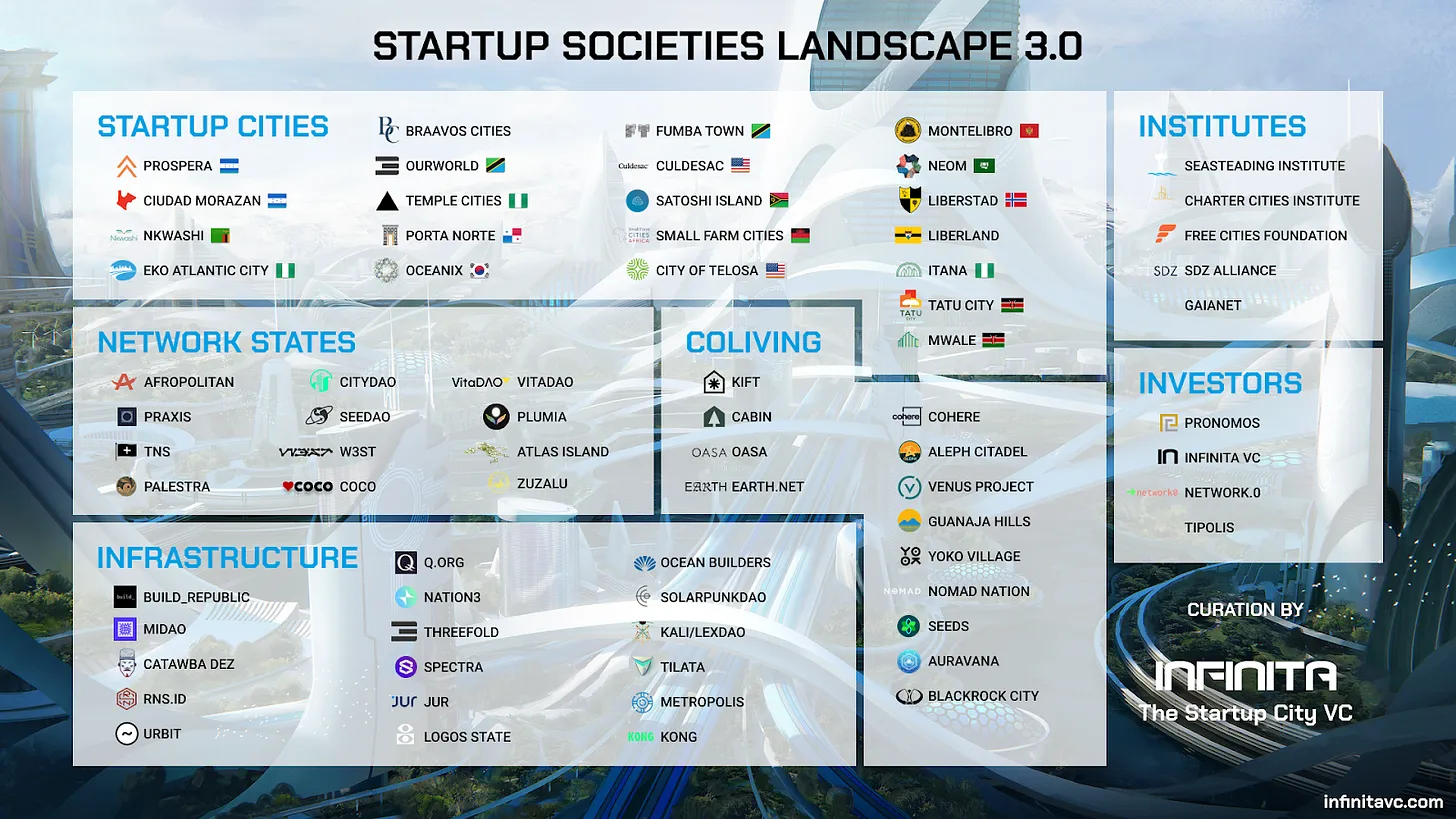
Parallel Media: Glenn Greenwald talks about how censorship is bad, surveillance is bad, efforts to quash “disinformation” are mostly a tool of censorship. Point well taken. Dan Romero pitches Farcaster, a decentralized Twitter alternative. The other talks in this category are devoted to complaining about existing media institutions.
Parallel Education: tl;dr, “Let’s replace schools with accelerators.” Sure, I’ll buy it. More of a resource-allocation problem than an education problem. Surprisingly, no talk of charter school voucher systems or income-share agreements. This is perhaps another reflection of the extent to which the classical libertarians here are outnumbered by the center-right techno-accelerationists.
Parallel Laws: Kind of a catchall category, not actually much to do with laws. Spencer Macdonald of crypto security company Spearbit is the only one to try to engage with the serious national-defense and law-enforcement aspect of statecraft, but his three-prong plan is basically “campus police, propaganda arm, and Buy My Company’s Auditing Product.” Mark Lutter of the Charter Cities Institute gives a pretty clearheaded overview of the economic case for charter cities and how the field is progressing; if you want to get a really quick impression of the conference, watch one sane talk and one insane talk. An insane talk won’t be hard to find. This is probably a good choice for the sane talk.
Parallel Biomedicine: Longevity, longevity, and DeSci.
Parallel Finance: Cryptocurrency and DeFi continue to exist. It’s so over for the dollar. SEC sux.
Odds and ends
- Balaji, introducing the Winklevosses: “Can I get a ‘Fire Gary Gensler’?”.
- But later, speaker Kathleen Tyson mentions that she received something called a “Central Bank Award”. No boos!
- Patri Friedman says apparently the point of seasteading is actually not to be lawless, and he’s annoyed that people always think that. Instead, the ship flies some country’s flag, but the idea is to make countries compete for it, since it’s easier to swap out a flag than to relocate a city. (Of course, it’s illegal under international law to sail a merchant ship not registered with some country, and one wonders if seasteaders would go around applying for flags in the absence of such a law.)
- But he pivoted from seasteading to charter cities anyway. “Dirt is not a rendering… Dirt is real.”
- Cabin’s fundamental primitive is citizenship, not houses or villages; instead, the list of places considered part of the network is implemented as a token-curated registry that citizens vote on.
- Dryden Brown says there have “actually been a few marriages that have come out of Praxis.”
- Stefan Zingerle says his company, real estate developer Casa Orascom, rehabilitated a Dakar slum by using two-thirds of the land to build all the slum residents nice apartments to live in and stores to work at, which makes land value goes up, which lets them recoup the costs by building market-rate apartments in the other third. Big if true, though it seems too good to be – how can everyone suddenly afford the rent on the new apartments? are they subsidized forever with the proceeds from the revenue-generating third? how does a real estate company magick job-creating stores into existence? – but I can’t find any external coverage.
- Alexis Rivas’s company, Cover, constructs prefab accessory dwelling units en masse. He thinks zoning could be better done by focusing on a few important, legible properties – views, privacy, light – and trading them as property rights. “Space will be negotiated without intermedaries,” he says. And Cover wants to get zoning permits en masse as well by preapproving a few layouts and then building them everywhere. The images have that same AirSpace-y aesthetic uniformity as Nomad, but I’m inclined to cut Cover more slack because this feels like a lesser-of-two-evils attempt at fighting housing shortages, rather than monotony for monotony’s sake.
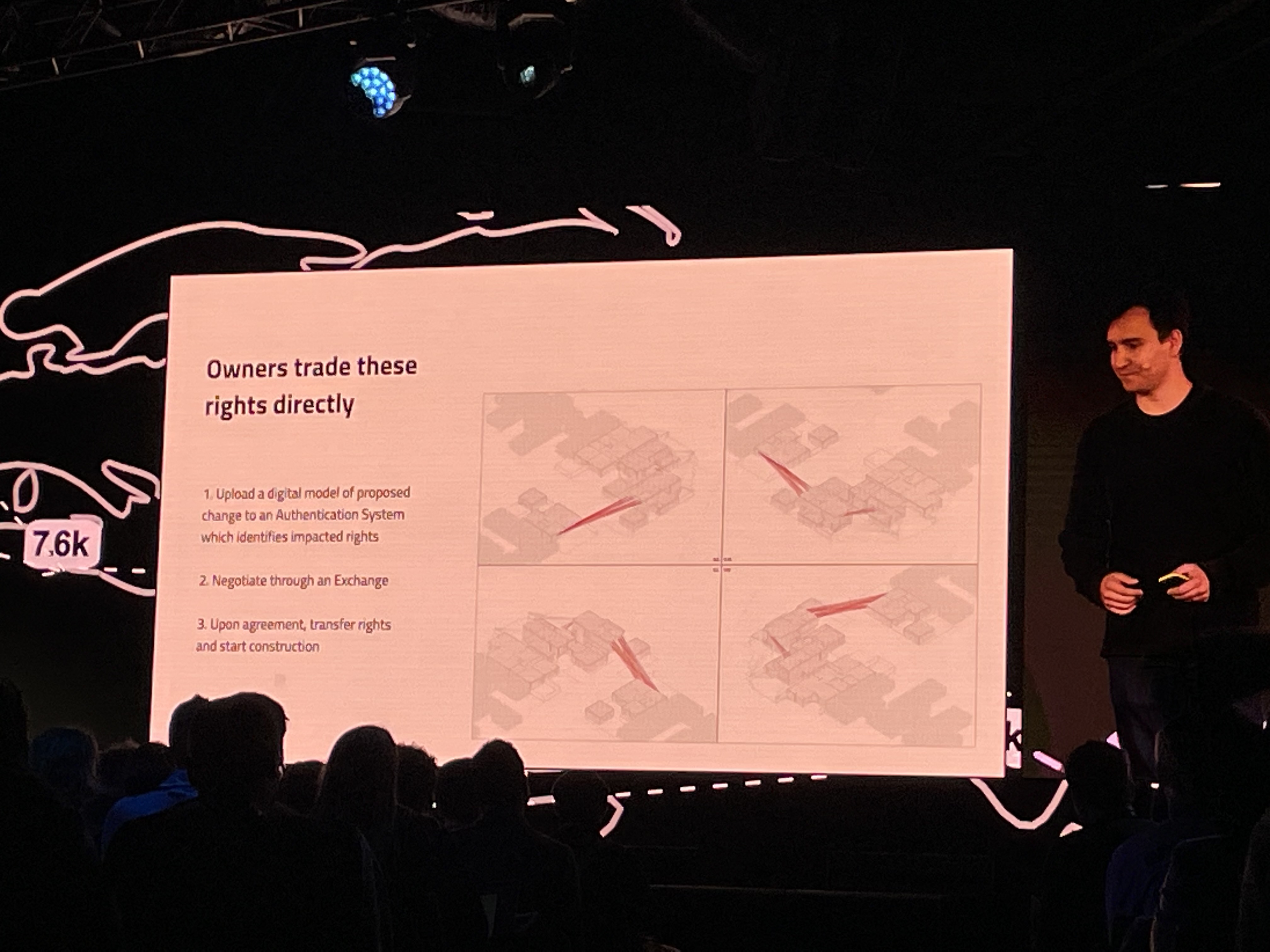
Alexis Rivas of Cover
- Glenn Greenwald discusses France’s censorship of Rumble. France says you have to censor Russian state media, Rumble says fine, then we’ll just cut off France entirely. Uses it to make a point about how physical decentralization only goes so far when there’s still a centralized legal entity to target.
- Nuseir Yassin: “The founder of the country is the one that’s gonna make the country. Countries don’t happen organically. And so in this scenario, the founder of the community should be able to make money and own the community.” (He’s a YouTuber; the charitable interpretation is something like “artists should get more money and rights from their work, instead of it all getting sucked up by platforms.”)
- Earnest Urbanist Named Ryan #2, Ryan Rzepecki of Spectra, talks for seven minutes about smart walkable mixed-use paradises with raised greenways and pedestrian tunnels. Then he drops a slide advertising “YIMBY-NIMBY War,” his forthcoming VR first-person shooter where you… gun down the NIMBYs in your city, GTA-style? No, upon further inspection, you are not actually massacring the NIMBYs themselves, but rather liberating them by shooting the misguided zoning ideas that possess them.

- Startup cities could hypothetically do lots of experimentation with mechanism design – one imagines the Harberger-tax utopia. But what they always seem to do in practice is just something like “make corporate taxes really low”. Is there room for improvement? Maybe they should offer massive tax breaks for mechanism designers.
- Many crypto-type conferences tend to get clogged with people peddling frivolous applications for fear of drawing scrutiny over more serious ones. But I think the only real utility of cryptographic hardness occurs when things like money, safety, and sovereignty are at stake, like when you’re building your own financial institution or government. So it’s refreshing to hear people here speak frankly about large-scale ambitions of working outside the existing system, even if some are pie-in-the-sky.
- The Network State Conference kind of reminds me of an event I attended this summer – the Porcupine Freedom Festival, which is the flagship event of the New Hampshire libertarian group known as the Free State Project. (The Boston Globe covers it better than I could have.) Lots of themes echo, like giving children autonomy and hating central banks and hating the FDA, but PorcFest leaned more salt-of-the-earth: homeschooling and child labor instead of AI tutors, goldbacks instead of Solana, antivax instead of longevity, trucker hats instead of heathered baseball caps.
- This wasn’t part of the conference, but I’m sneaking it in anyway while we’re on the topic of libertarian city planning: cyclists in Amsterdam, perhaps the bike capital of the world, rarely wear helmets. I wonder if that’s a necessary ingredient for a bike empire?
- Thank you to Balaji for comping me a ticket when I was like “hey I’m in Amsterdam but the conference is sold out 🥺🙏🤞”, and forgive me for doing ~journalism~ at your event.
